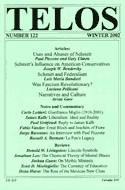By John Milbank and Adrian Pabst · Thursday, August 14, 2014 We agree with Joshua Ralston that all forms of religious fundamentalism demand both universal and unconditional condemnation as well as regional and global responses to help all the victims—irrespective of their faith. We also agree with him that it is wrong to judge age-old religious traditions by modern secular, liberal standards and that essentialized notions distort complex cultural and historical realities.
Continue reading →
By Michael Millerman · Tuesday, August 12, 2014  Like Spinoza, many liberal thinkers have defined the liberty they promote in terms of the necessity of submitting to the law that guarantees it. This is a unique kind of rule of law, a rule of the “‘politically correct,’ universalist, managerial-liberal” (9) law of contemporary liberals. Both internationally and domestically, this law requires the muscular imposition of questionable political, moral, and economic principles, by means of an insidious and often nauseating bureaucratic, technocratic, mediacratic apparatus, onto largely unwilling publics. Crucially, the freedom championed by such liberals and allegedly secured by their law does not include the freedom to refuse their domination root and branch. Like Spinoza, many liberal thinkers have defined the liberty they promote in terms of the necessity of submitting to the law that guarantees it. This is a unique kind of rule of law, a rule of the “‘politically correct,’ universalist, managerial-liberal” (9) law of contemporary liberals. Both internationally and domestically, this law requires the muscular imposition of questionable political, moral, and economic principles, by means of an insidious and often nauseating bureaucratic, technocratic, mediacratic apparatus, onto largely unwilling publics. Crucially, the freedom championed by such liberals and allegedly secured by their law does not include the freedom to refuse their domination root and branch.
Continue reading →
By Telos Press · Monday, August 11, 2014 The Daily Beast has posted an excerpt from Joel Kotkin’s The New Class Conflict, forthcoming from Telos Press. Read the full excerpt here and pre-order your copy of The New Class Conflict in our online store.
Continue reading →
By Telos Press · Friday, August 8, 2014 Writing in the current issue of Modern Age (Summer 2014), Tobias J. Lanz reviews Ernst Jünger’s The Forest Passage:
This is a book about freedom. It was first published in 1951 as a response to the Nazi experience and the perceived threat of Soviet expansion. Its explicit focus was resistance to the totalitarian state. Yet its implicit focus is resistance to all forms of social control, including the soft totalitarianism of present-day mass democracy. And this why Ernst Jünger’s classic remains relevant today, and that is why Telos Press has reissued it. . . .
Continue reading →
By Telos Press · Monday, July 21, 2014  In his forthcoming book The New Class Conflict, Joel Kotkin explores how the familiar social and political categories of the twentieth century—left and right, liberal and conservative—no longer correspond to the emerging divisions of the present day. Kotkin’s analysis insead focuses on the ascendency of two classes: the tech Oligarchy, based in Silicon Valley; and the Clerisy, which includes much of the nation’s policy, media, and academic elites. The New Class Conflict is written largely from the point of view of those who are, to date, the losers in this class conflict: the middle class. This group, which Kotkin calls the Yeomanry, has been the traditional bulwark of American society, politics, and economy. Yet under pressure from the ascendant Oligarchs and ever more powerful Clerisy, their prospects have diminished the American dream of class mobility that has animated its history and sustained its global appeal. In his forthcoming book The New Class Conflict, Joel Kotkin explores how the familiar social and political categories of the twentieth century—left and right, liberal and conservative—no longer correspond to the emerging divisions of the present day. Kotkin’s analysis insead focuses on the ascendency of two classes: the tech Oligarchy, based in Silicon Valley; and the Clerisy, which includes much of the nation’s policy, media, and academic elites. The New Class Conflict is written largely from the point of view of those who are, to date, the losers in this class conflict: the middle class. This group, which Kotkin calls the Yeomanry, has been the traditional bulwark of American society, politics, and economy. Yet under pressure from the ascendant Oligarchs and ever more powerful Clerisy, their prospects have diminished the American dream of class mobility that has animated its history and sustained its global appeal.
Continue reading →
By Telos Press · Tuesday, July 15, 2014 At the National Review Online, Fred Bauer explores the rise of neofeudalism in American society, and in doing so he draws explicitly on the writings of Joel Kotkin, whose forthcoming book The New Class Crisis will be published by Telos Press on September 1. Pre-order your copy of The New Class Crisis today, and we will ship it as soon as it becomes available.
Continue reading →
|
|
 Like Spinoza, many liberal thinkers have defined the liberty they promote in terms of the necessity of submitting to the law that guarantees it. This is a unique kind of rule of law, a rule of the “‘politically correct,’ universalist, managerial-liberal” (9) law of contemporary liberals. Both internationally and domestically, this law requires the muscular imposition of questionable political, moral, and economic principles, by means of an insidious and often nauseating bureaucratic, technocratic, mediacratic apparatus, onto largely unwilling publics. Crucially, the freedom championed by such liberals and allegedly secured by their law does not include the freedom to refuse their domination root and branch.
Like Spinoza, many liberal thinkers have defined the liberty they promote in terms of the necessity of submitting to the law that guarantees it. This is a unique kind of rule of law, a rule of the “‘politically correct,’ universalist, managerial-liberal” (9) law of contemporary liberals. Both internationally and domestically, this law requires the muscular imposition of questionable political, moral, and economic principles, by means of an insidious and often nauseating bureaucratic, technocratic, mediacratic apparatus, onto largely unwilling publics. Crucially, the freedom championed by such liberals and allegedly secured by their law does not include the freedom to refuse their domination root and branch.  In his forthcoming book The New Class Conflict, Joel Kotkin explores how the familiar social and political categories of the twentieth century—left and right, liberal and conservative—no longer correspond to the emerging divisions of the present day. Kotkin’s analysis insead focuses on the ascendency of two classes: the tech Oligarchy, based in Silicon Valley; and the Clerisy, which includes much of the nation’s policy, media, and academic elites. The New Class Conflict is written largely from the point of view of those who are, to date, the losers in this class conflict: the middle class. This group, which Kotkin calls the Yeomanry, has been the traditional bulwark of American society, politics, and economy. Yet under pressure from the ascendant Oligarchs and ever more powerful Clerisy, their prospects have diminished the American dream of class mobility that has animated its history and sustained its global appeal.
In his forthcoming book The New Class Conflict, Joel Kotkin explores how the familiar social and political categories of the twentieth century—left and right, liberal and conservative—no longer correspond to the emerging divisions of the present day. Kotkin’s analysis insead focuses on the ascendency of two classes: the tech Oligarchy, based in Silicon Valley; and the Clerisy, which includes much of the nation’s policy, media, and academic elites. The New Class Conflict is written largely from the point of view of those who are, to date, the losers in this class conflict: the middle class. This group, which Kotkin calls the Yeomanry, has been the traditional bulwark of American society, politics, and economy. Yet under pressure from the ascendant Oligarchs and ever more powerful Clerisy, their prospects have diminished the American dream of class mobility that has animated its history and sustained its global appeal. 

